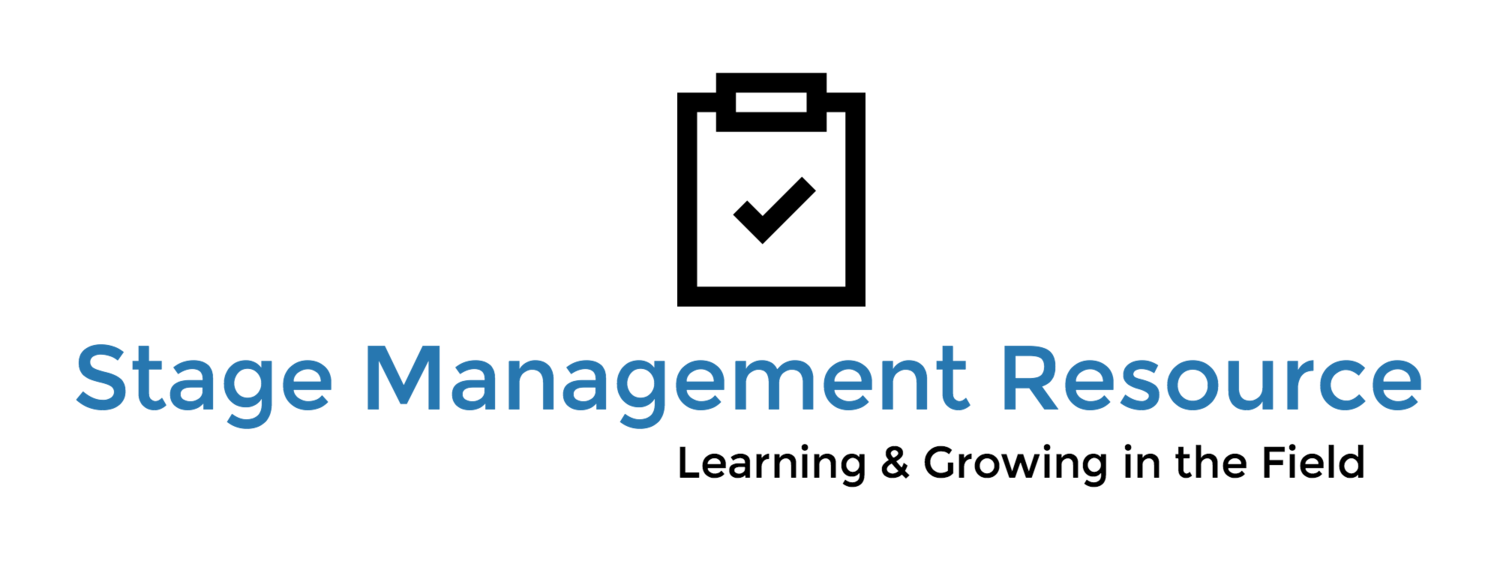Stage Management Duties
While stage management duties vary by both the institution and the production, below is a list of common stage management duties.
Pre-Production
Review Institutional and/or Union Rules Regarding Production
Create a Contact Sheet
Create and Distribute Emergency Contact Forms
Create a Rehearsal Schedule w/ the Director
Get the Ground Plan and Dimensions of the Performance Space
Tape Out Ground Plan, To Scale, in Rehearsal Space
Distribute Rehearsal Schedule
Distribute Daily Rehearsal Calls
Figure out Specific Needs of Production (Knee Pads, Rosin, Music Stands, etc.)
Begin Communicating with Director and Design Team about Production Vision and Goals
Assist Production Manager in Planning First Production Meeting
Prepare you SM Kit
Prepare and Print YOUR Rehearsal Script
Find Out If You Need to Print the Company's Scripts
Rehearsal Process
Distribute Daily Rehearsal Calls
Collect Emergency Contact Forms
Call Breaks
5 Minute Break AFTER 55 Minutes OR
10 Minute Break AFTER 80 Minutes
Call Meal Breaks, If Rehearsal is Longer Than 5 Hours
Protect the Safety of the Cast
Record Blocking Notes
Notate Script/Score Changes
Distribute Script/Score Changes
Create Props List
Create Costume List
Record Prop Tracking
Record Quick Changes
Coordinate and Facilitate Communication within the Design Team
Send Rehearsal Reports
Rehearsal Time
Actor Called
Day's Work
Late Arrivals/Absences
Illnesses/Injuries
Notes for EACH Technical Department (including additions and alterations)
Scenic
Props
Lighting
Sound
Costumes
Projection
Hair/Makeup
Upcoming Events
Run-Throughs
Visiting Guests
Publicity
Tech Process
Lead Rehearsals of the Show, Stopping to Insert Design/Technical Elements (Automation Cues, Light Cues, Sound Cues, Music, Costumes, Quick Changes, Prop Hand Offs, Crossover Timing)
Record Position of All Cues
Create and Maintain the Calling Script w/ All Cue Information
Begin Calling Cues
Create and Distribute Preset Lists for Backstage Crew
Create and Distribute Run Sheets for Backstage Crew
Manage Backstage Crew
Organize Backstage Traffic
Find Solutions to Potential Safety Problems (Glow Tape on Dark Pieces, Covered Corners on Sharp Pieces)
Continue Sending Rehearsal Reports
Performances
Coordinate with Front of House to Open the House and Begin the Performance
Call the Show's Cues, Including:
Automated Scenery
Lights (may OR may not include Follow Spots cues)
Sounds
Projection
Orchestra
Actors
Maintain the artistic integrity (the director's vision) of the show
Run rehearsals to assist show maintenance
Runs rehearsal for all understudies/replacements
Update the Calling Script and
Update Preset Lists and Run Sheets
Send Performance Reports regarding with information including:
Late Arrivals/Absences
Illnesses/Injuries
Run Length
Audience Reaction
Issues with Scenery or Props
Issues with Costumes
Issues with Light Instruments or Board
Issues with Sound Equipment
Dropped Lines / Missed Cues / Show Error
Any Other Unusual Occurrences
While in the Theater, AEA Stage Managers Typically DO NOT*:
Move Scenery or Props
Operate Light, Sound, AV, or Automation boards
Order Food for the Company
Make Payroll or Distribute Salaries
Handle Contracts / Riders
In Non-AEA Houses, some of the aforementioned duties DO fall to the stage manager.
Other Guides
The 10 Commandments of Stage Management by Angela Mitchell
Stage Managers DO Make Coffee by Carissa Dollar
Here's an AMAZING excerpt from Dollar's guide:
10 GOLDEN RULES OF STAGE MANAGEMENT
Learn From Mistakes. No one is perfect. We all make mistakes as we practice our crafts. The best thing anyone can do is to analyze these situations and learn how to avoid making the same mistake again.
Don't Panic! Always remain calm, cool and collected. Never, Never yell. All Stage Managers should know the difference between raising their voices to be heard and yelling. If the Stage Manager loses it, everyone will panic.
Safety First! The cast shouldn't set foot on the stage unless you would walk on it barefoot. Inspect the set daily for potential problems. Are all stairs and platforms secure? Are all escapes adequately lit and glow taped? Do you know where the first aid kits and fire extinguishers are located? Who is certified in CPR and First Aid? The SM should be!
Plan & Think Ahead. What can be done to avoid problems? How can the Stage Managers make life easier for everyone?
There Are No Dumb Questions. It is better to ask and fell silly for a few seconds than to cause a disaster later.
Prioritize Tasks & Delegate Authority. One person can't do everything. Why do we have assistants if we don't use them?!
Early Is On Time. The SM should always be the first person in and the last person out of the theatre for a meeting or rehearsal. I always try to show up about 15 minutes before I really think I need to be there, just in case traffic is bad or any problems or delays occur.
Put Everything In Writing. In other words, be a communicator! Dated daily rehearsal notes aid in communication and help to avoid conflicts over when requests or changes were made. (Voice mail and email are also great forms of communication! Get a pager or cel phone so you are easy to reach at all times!)
Please & Thank You. Use these word everyday, especially when you are working with volunteers.
Stage Managers DO Make Coffee. They also do a million other menial tasks that are meant to make people happy and boost morale. Buy donuts, bake brownies, make sure birthdays are recognized, and hole-punch all paperwork. These little things are really appreciated by everyone.
